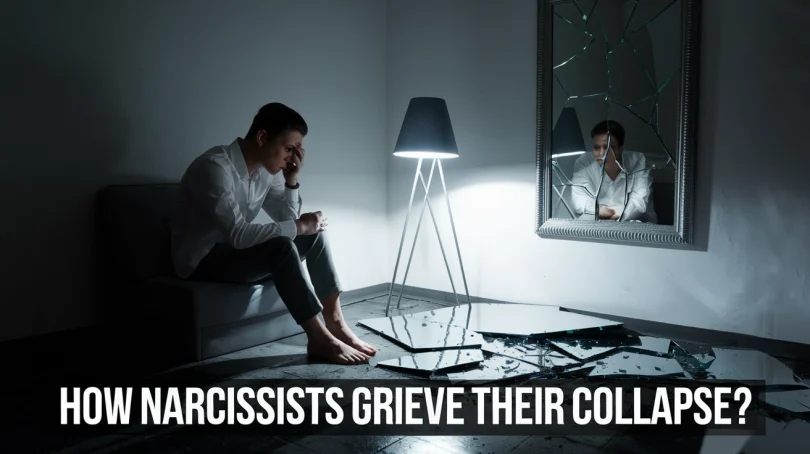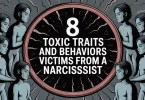Collapse occurs when a narcissist can no longer secure an uninterrupted flow of high-quality narcissistic supply or any form of attention. This happens when there is a systemic failure to obtain supply despite all strategies, activities, attempts, and collaborative operations. The narcissist tries everything imaginable, and even unimaginable things, but nothing works. There is no narcissistic supply; the narcissist is ignored, ridiculed, rejected, abandoned, forgotten, and obscured. This state is known as narcissistic collapse.
Misconceptions About Narcissistic Collapse
Many self-styled experts use the phrase “failed narcissist,” which is completely wrong. A failed narcissist is a borderline personality. A collapsed narcissist is different, and today we will discuss the internal and effective reactions of a narcissist to the state of collapse. Collapse has profound impacts on the narcissist’s internal world, emotional regulation, mood stability, perception, cognition, and more. In other words, collapse alters, transforms, and transmogrifies the narcissist.
The Role of Entitlement in Narcissistic Collapse
The collapse has a lot to do with entitlement. Entitlement is the feeling that the narcissist harbors that he or she deserves special treatment by special people, regardless of any investment, commitment, hard work, or real-life accomplishments. There is a gap, a discrepancy, between the narcissist’s feeling of entitlement and real-life achievements, effort, and planning.
Related:
5 Sneaky Tactics Narcissists Use to Target Innocent Souls
10 Hidden Motives Why Narcissists Pretend to Be Nice
Understanding the 4 Types of Narcissism
How Narcissists Try to Control You?
The Narcissist’s Belief System
The narcissist walks through life believing that he deserves everything the best, the most, and before others. He believes that his mere presence is a sufficient contribution and that by bringing himself into a conversation, workplace, or relationship, he is making a major concession. This overvaluation and overestimation of his participation is known as over-perception.
Entitlement and Unconditional Love
Entitlement is the flip side of unconditional love. The narcissist identifies entitlement with unconditional love. It’s as if the universe should love the narcissist unconditionally and give the narcissist unconditionally. The narcissist, as a child, has been deprived of unconditional love. Any love the narcissist received as a child was predicated or conditioned upon performance or, in many cases, was absent altogether.
The Developmental Path to Narcissism
Early Childhood Experiences Whatever the developmental path that led to narcissism adversarial paths, adverse childhood experiences, pampering, spoiling, idolizing, instrumentalizing, and parentifying all these paths lead to narcissistic personality disorder in some cases. But all of them involve the absence or lack of maternal love, mainly from the key mother. The kind of maternal love that is utterly disconnected from, not related to, and not conditioned upon the child’s performance.
The Narcissist’s Lifelong Search
The narcissist goes through life looking for unconditional love. The best way to prove, demonstrate, and exhibit unconditional love is to give the narcissist what he does not deserve. If you give someone something that is not the outcome of self-interest or any performance on the part of the recipient, then you love the recipient unconditionally. The narcissist feels entitled to unconditional love because everyone else has had it at least once in a lifetime during early childhood. The narcissist didn’t have it, so now he deserves it.
The Impact of Collapse on the Narcissist
Perceived Loss of Unconditional Love When the narcissist is denied unconditional love, denied attention, denied narcissistic supply, ignored, placed in a corner, rejected, mocked, demeaned, shamed, or humiliated, the ensuing collapse is perceived as a loss of unconditional love. Even more profoundly, it is perceived as a loss of maternal love. It’s as if the entire universe, or at least the human environment in which the narcissist finds himself, are mother substitutes. If they don’t give the narcissist unconditional love and cater to his entitlement, then this proves they don’t love him unconditionally.
Grief and Loss in Collapse
When we are denied maternal love or lose something that matters to us a lot, like narcissistic supply, something we depend on and that defines us, we grieve. Narcissistic supply is a kind of drug; there’s an addiction involved. But the addiction is to external regulation. Narcissistic supply, attention, the gaze of other people, and being seen and noticed by other people, allow the narcissist to regulate his internal environment using these external inputs and feedback. When this is absent, it’s a major loss, possibly the major loss in the narcissist’s life.
Grief Over Loss of Self
In the wake of the collapse, the narcissist feels that he or she has lost something immeasurably critical, something that is coextensive with their core identity. They have lost themselves. The grief is huge it is grief over an external aspect of reality, the narcissistic supply that emanates from other people, but it is also grief about the obliteration of the internal landscape. The internal objects that represent sources of narcissistic supply are no longer active or cannot be active, and the loss of one’s self, one’s ego, one’s sense of self-worth, all these are constructed on the fly by the narcissist from inputs provided by other people.
The Process of Collapse
Collapse is a form of internal mortification. Narcissistic mortification is the sudden, abrupt, unexpected humiliation and shaming of the narcissist by another person. The infliction of a narcissistic injury or wound that is so severe it consumes the totality of the narcissist. It must be sudden, unexpected, and abrupt so that the narcissist’s defenses are not at the ready. In the majority of cases, this generates a huge sense of shame because the narcissist, denuded of his defenses, is then unable to fend off the early childhood reservoir of shame inside.
Shame and Depression
Many scholars believe that pathological narcissism is a compensation for shame. When the defenses are down, when there’s a process called decompensation, the shame erupts volcanically and reduces the narcissist to ashes. In a state of collapse, the main effect is shame a life-threatening shame that leads later to depression.
External vs. Internal Mortification
External mortification is amplified tenfold if the humiliation and shaming are done publicly, especially in front of peers, significant others, or role models of the narcissist. But there is a possibility of internal mortification, which is a form of collapse. It’s the shaming and humiliation of the narcissist in front of an internal audience self-audience. The narcissist becomes his or her audience, and the failure to obtain supply is shameful, humiliating, degrading, denigrating, and demeaning.
The Stages of Grief in Narcissistic Collapse
Shock and Numbing
The process of collapse is a process, not an event. There are warning signs that the narcissistic collapse is dwindling and waning. The narcissist should be aware that shortly, the spigot of narcissistic supply is going to be turned off, and the flow is going to cease. While in external narcissistic mortification, the humiliation, shaming, rejection, abandonment, mocking, and ridiculing are abrupt, sudden, destabilizing, and decompensating, in internal mortification, this should not be the case. The narcissist should be able to predict the imminent, oncoming, looming collapse.
Denial and Anger
The narcissist perceives the collapse as a point-like event, which is sudden and abrupt because the narcissist constantly denies the signs of the imminence of the collapse. Whenever the narcissist is confronted with some fact, utterance, or behavior that indicates that soon there’s going to be a collapse, the narcissist denies these signs, ignores this data and information, reframes them, and somehow succeeds in pretending that collapse is not around the corner. This is why narcissists are often involved in the collapse of companies and countries—they deny reality; they have impaired reality testing.
Fear and Panic
Internal mortification, although admittedly and indeed being a process, is perceived by the narcissist to be an event because of the denial of all precursors and all paths leading to the collapse. Both external and internal mortification are experienced as sudden and abrupt, destabilizing, and dysregulating. Now, grief is at the core of pathological narcissism, together with shame. The narcissist grieves himself because he is constantly ashamed.
Guilt and Isolation
Narcissists are two-year-old infants who are trapped in a post-traumatic condition characterized by perpetual, prolonged, complicated grief coupled with depression. They grieve the forlorn relationship with the mother, who they could have become and never will be their boundaries, and the way they’ve been abused and mistreated. There are many things to grieve in the narcissist’s early life history. So, grief is a prominent feature of pathological narcissism.
Reconstruction and Bargaining
In 1942, Harvey Cleckley hypothesized that narcissists and psychopaths may be emotionally hypersensitive and inordinately intelligent. Be that as it may, because these contentions are disputable, these disorders, especially pathological narcissism, are defensive attempts to wall off, isolate, and firewall emotions that were, at the time in early childhood, so profound that they threatened to overwhelm and dysregulate the narcissist. As a child, the narcissist learned the arts of burying, repressing, suppressing, and denying emotions, especially positive emotions, because positive emotions are linked with negative outcomes. Love led to pain; attachment led to hurt and rejection. Narcissists learned to not do any of these.
Depression and Acceptance
These are defensive attempts, and there is a post-traumatic state. Narcissism and other Cluster B personalities are post-traumatic states, and they can best be described as complicated grief or prolonged grief reactions. A later scholar, J.S. Grotstein, suggested in 1984 that borderline personality disorder was the outcome of a failed effort by the child to deploy pathological narcissism to avert and forestall ominous emotional reactions to extreme abuse. Otto Kernberg called narcissism a defense against the emotional dysregulation of the borderline.
Finding Meaning and Hope
We see here some kind of devastation system-wide devastation and chaos where there are desperate attempts by the individual to somehow defend against this internal scene of battle and conflict. All this is so self-harming and self-negating that there is a lot of grief, a lot of mourning involved. The individual mourns who he is, who he could have become and never will be, the impossibility of meaningful relationships, and the individual has a lot to mourn self-destructiveness, and self-defeat. There’s a lot to grieve in the narcissist’s life, and in the wake of the collapse, there is this process of grieving over the loss of narcissistic supply a major loss.
Conclusion
In the wake of the collapse, the narcissist goes through stages of grief, starting with shock and numbing, followed by denial, anger, fear, guilt, isolation, reconstruction, bargaining, depression, and finally acceptance. The narcissist eventually finds meaning and hope in a new narrative, reconstituting himself in the way he has always been an obnoxious, unempathetic actor in the theater production that is his life.







Leave a Comment